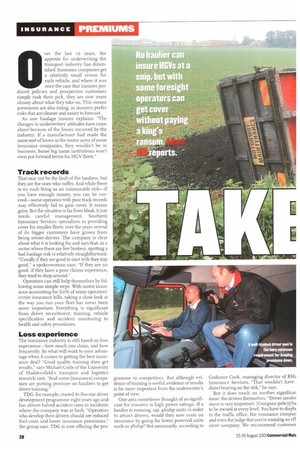vet the last io years, the appetite for underwriting the
Page 28

Page 29

If you've noticed an error in this article please click here to report it so we can fix it.
transport industry has diminished. Insurance companies get a relatively small return for each vehicle, and where it was once the case that insurers produced policies and prospective customers simply took their pick, they are now more choosy about what they take on, This means premiums are also rising, as insurers prefer risks that are cleaner and easier to forecast.
As one haulage insurer explains: The changes in underwriters' attitudes have come about because of the losses incurred by the industry. If a manufacturer had made the same sort of losses as the motor arms of some insurance companies, they wouldn't be in business. Some big name institutions won't even put forward terms for HGV fleets."
Track records
That may not be the fault of the hauliers, but they are the ones who suffer. And while there is no such thing as an uninsurable risk—if you have enough money, you can be covered—some operators with poor track records may effectively fail to gain cover. It seems grim. But the situation is far from bleak, it just needs careful management. Southern Insurance Services specialises in providing cover for smaller fleets; over the years several of its bigger customers have grown from being owner-drivers. The company is clear about what it is looking for and says that, in a sector where there are few brokers, spotting a bad haulage risk is relatively straightforward. "Usually if they are good to start with they stay good," a spokeswoman says. ``If they are no good, if they have a poor claims experience, they tend to shop around."
Operators can still help themselves by following some simple steps. With motor insurance accounting for Go% of some operators' entire insurance bills, taking a close look at the way you run your fleet has never been more important. Everything is significant from driver recruitment, training, vehicle specification and accident monitoring to health and safety procedures.
Loss experience
The insurance industry is still based on loss experience—how much you claim, and how frequently. So what will work to your advantage when it comes to getting the best insurance deal? "Good quality training does get results," says Michael Coyle of the University of Huddersfield's transport and logistics research unit. "And some [insurance] companies are putting pressure on hauliers to get driver training."
TDG, for example, started its five-star driver development programme eight years ago and has almost halved accident rates in incidents where the company was at fault. "Operators who develop their drivers should see reduced fuel costs and lower insurance premiums," the group says. TDG is now offering the pro gramme to competitors. But although evidence of training is useful, evidence of results is far more important from the underwriter's point of view.
One area sometimes thought of as significant for insurers is high power ratings. If a haulier is running, say, 46ohp units in order to attract drivers, would they save costs on insurance by going for lower powered units such as 38ohp? Not necessarily, according to
Grahame Cook, managing director of RH) Insurance Services. "That wouldn't have direct bearing on the risk," he says.
But it does touch on another significan issue: the drivers themselves. "Driver involw ment is very important. [Company policy] ha to be owned at every level. You have to displa to the traffic office, the insurance compan and even the judge that you're running an eff cient company. We recommend customer Eke a broad brush approach," he adds.
This is not the whole story, however, lichael Hibling, national servicing director of isurance services group Heath Lambert, andles FTA insurance services. He agrees tat driver involvement is key, but says canidly: 'These factors are more likely to drive ites up if they are bad rather than drive them :Iwn if they are good." In other words, runEng a closely-monitored operation with a
well-trained workforce is the minimum requirement for hauliers seeking decent deals these days.
The RHA has two services for its members, both aimed at putting hauliers in a position where insurance companies will offer them favourable terms. The first of these is ICON. "It concentrates on the effective running of the operation, which is then clearly documented by the company," says Cook. "This gives a professional approach to management and ensures potential problems are highlighted."
The group's Risk Aware programme is aimed at reducing the risks involved with the running of the fleet and the goods in transit. A detailed questionnaire is filled out as the precursor to a detailed analysis of the business. Where there are problems. "we take remedial action, putting solutions in place with an action plan," Cook says. Quarterly reviews with the client follow. The objective is to stop accidents happening and to create a better-run business. "We're very much prevention rather than cure," Cook adds.
Accidents, inevitably, do happen, and some with fatal results. RHA Insurance Services also provides a legal expenses policy in conjunction with solicitor Ford & Warren to help in cases where corporate manslaughter charges are brought. When it comes to the law, it is also important to tell a potential insurer the truth, not least because a great deal of information on accidents and convictions is now pooled by insurance companies. "You've got to declare them," Southern Insurance Services' spokeswoman says. "Otherwise it sets off alarm bells with the insurance company—'what else hasn't he declared?"
It is undoubtedly more difficult fbr hauliers to get insurance than a decade or so ago. But the principles of good practice operate in this market in just the same way as they do everywhere else. "We've got to work with our customers to position them to get the best terms available," Cook says. The competitive pressure on premiums is not enough any more."




























































































































